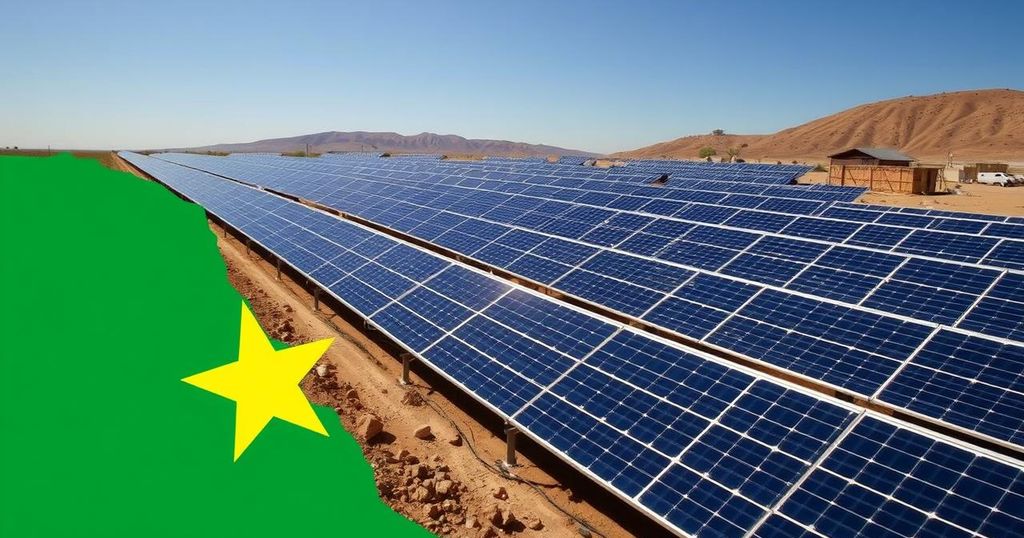Egypt Enhances Ties with Djibouti Through Solar Energy Project

Egypt has entered into a solar power project with Djibouti to provide alternative energy sources and reduce Djibouti’s reliance on Ethiopia. The agreement includes the establishment of a solar farm with 276.5 kilowatts capacity and plans for expansion. This initiative is seen amidst broader tensions between Egypt and Ethiopia over Nile water rights, with Djibouti’s unique position as a trade hub playing a critical role in regional dynamics.
Cairo has strengthened its ties with Djibouti through a new solar power initiative aimed at providing alternative energy sources for the Horn of Africa nation and decreasing its reliance on Ethiopia, a regional adversary. The project entails the establishment of a solar power farm in Djibouti’s arid territories, with initial capacity set at 276.5 kilowatts, potentially expandable to 300 kilowatts in the future. Egypt will oversee the funding and also provide training for Djiboutian technicians to operate the facility. This agreement was virtually signed by Egypt’s Energy Minister, Mahmoud Essmat, and his Djiboutian counterpart, Yonis Ali Gued, who focused their discussions on economic aspirations, notably sidestepping the political ramifications of their collaboration. The solar power plant will be located near the village of Omar Jaggaa, and Djibouti’s government emphasized that this agreement not only denotes enhanced cooperation between the two nations but also aligns with President Ismail Omar Guelleh’s prioritization of energy access as essential to the nation’s economic development. Observers have noted that this renewed relationship could have broader implications within the Horn of Africa, particularly given the historical tensions between Egypt and Ethiopia concerning Nile water rights and regional security issues in Somalia. Ethiopia and Djibouti maintain robust trade relations, with Ethiopia relying heavily on Djibouti for critical imports while Djibouti’s electricity supply is predominantly sourced from Ethiopia. The conflicts earlier this year between Somalia and Ethiopia concerning a controversial water access agreement led Djibouti to extend an invitation to Ethiopia to construct a new port within Djibouti for trade purposes, an offer that Ethiopia has yet to accept as it seeks to establish its own naval base. Recent developments include the completion of a 283-kilometer power transmission line funded by the African Development Bank which connects Djibouti with Dire Dawa in eastern Ethiopia, underscoring the critical dependency of Djibouti on Ethiopian energy supplies. The World Bank reports that continuous growth in Djibouti’s electricity demand, driven by increased port activity, signals an urgent need for diversified energy sources, prompting investments in renewable energy sectors such as solar and geothermal. Currently, 65 percent of Djibouti’s population has access to electricity, with projections indicating an increase to 72 percent once the new transmission improvements are operational. This percentage is anticipated to grow further with the commencement of the solar energy project.
The relationship between Egypt and Ethiopia has been strained over shared water resources of the Nile River, with both nations often at loggerheads over competing interests. As Ethiopia develops its Grand Ethiopian Renaissance Dam, concerns in Egypt regarding water security have intensified. In this geopolitical context, Egypt’s diplomatic outreach to neighboring Djibouti highlights its strategy to forge alliances with countries opposed to Ethiopian policies. Djibouti’s geographic position as a trade conduit and its energy partnerships with Ethiopia make it a pivotal player in the Horn of Africa, balancing its ties with both nations while seeking to enhance its own energy infrastructure through renewable sources.
In conclusion, the solar power project between Egypt and Djibouti represents a strategic effort by Egypt to leverage energy cooperation as a means of countering Ethiopia’s influence in the region. As the demand for electricity rises in Djibouti, the shift towards renewable energy will not only address local economic development needs but may also reshape regional alliances in the critical geopolitical landscape of the Horn of Africa. This development serves as a reminder of the interconnectedness of energy politics and regional security in this part of the world.
Original Source: www.theeastafrican.co.ke








